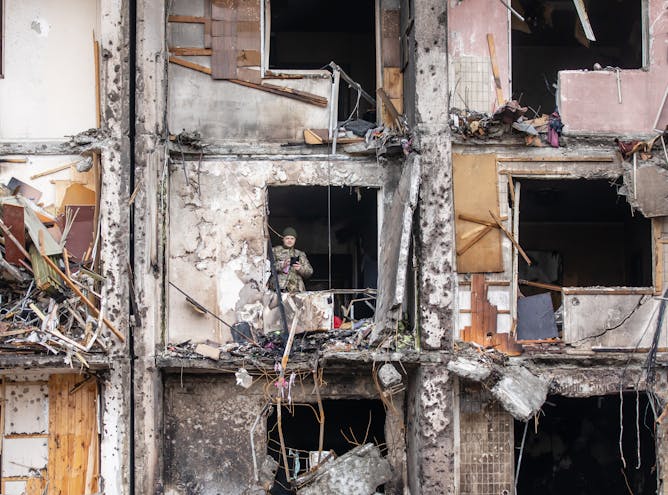|
As a career U.S. special forces officer, Liam Collins has a unique vantage point on the 2022 Russian invasion of Ukraine. He was part of an American military team that helped train Ukrainian soldiers after Russia’s 2014 attack on Ukraine and Georgia.
As such, Collins is well-placed to explain why the widely projected view that an overpowering Russian army would force a quick capitulation of Ukrainian forces didn’t happen. Instead, stiff Ukrainian resistance and massive amounts of Western military aid have tilted the balance, leaving “no end in sight,” he writes.
The resistance and counterattacks have caused Russian forces to slow and even halt some of its advances. The reality on the ground is forcing Russian President Vladimir Putin to learn a valuable lesson. “War is often much longer and costlier than anticipated,” Collins writes.
|

A Ukrainian soldier inspects a residential building after it was damaged following a Russian shelling attack In Kyiv.
Mykhaylo Palinchak/SOPA Images/LightRocket via Getty Images
Liam Collins, United States Military Academy West Point
Despite having superior military forces, Russian President Vladimir Putin has found Ukrainian resistance much tougher than expected. A West Point military expert looks at the future of the war.
|

Shirts for sale on Jan. 6, 2021, combined loyalty to Jesus and to Donald Trump.
Joyce Dalsheim
Joyce Dalsheim, University of North Carolina – Charlotte; Gregory Starrett, University of North Carolina – Charlotte
Thousands gathered to express their collective identity and desire to preserve the nation’s political and religious heritage – and to uphold what they saw as the rightful outcome of the 2020 election.
|

Overconfidence about their political knowledge is common among Americans.
FXQuadro/iStock/Getty Images Plus
Ian Anson, University of Maryland, Baltimore County
Many Americans think they know much more about politics than they really do. That overconfidence can thwart democratic politics.
|
|
|
-
Sean Lang, Anglia Ruskin University
Elizabeth II was a safe pair of hands for the British monarchy in a turbulent and changing era.
-
John Logan, San Francisco State University
Public support for unions is at a near 60-year high. Meanwhile, self-organizers at major American chains are spearheading a new movement to mobilize.
-
Elizabeth K. Anthony, Arizona State University
A lawsuit against police and school officials for how they responded to the kindergartner has been settled, but deeper systemic issues remain.
-
Sanjeev Jain, National Institute of Mental Health and Neurosciences, Bengaluru, India
Effects of violence and forced migration on survivors’ mental health have not been acknowledged, despite the trauma being passed down generations.
-
Rebecca Rozelle-Stone, University of North Dakota
Whether it is the war in Ukraine or other devastating news, people find it hard to sustain their attention. A scholar who studies crisis fatigue explains why that is so and what we can do.
-
Lauren Thompson, Kennesaw State University
The women’s rights movement in the 1800s did not openly support legalizing abortion or birth control. But the reasons why are complex.
|
|